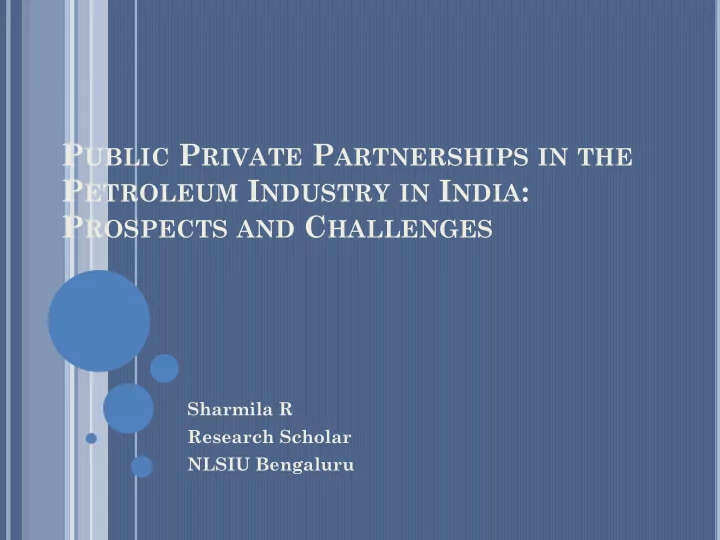

P UBLIC P RIVATE P ARTNERSHIPS IN THE P ETROLEUM I NDUSTRY IN I NDIA : P ROSPECTS AND C HALLENGES Sharmila R Research Scholar NLSIU Bengaluru
Energy Security/ meeting the energy requirements in an efficient manner - is one of the greatest challenges faced by the modern Indian polity - ‘Resource Curse’ - Dependence on fossil fuels- lack of technology to utilize the alternative energy resources - Continuing heavy reliance on imports Optimal utilization of the domestic hydrocarbon reserves is thus decisive to ensure energy security in the country
Art. 297 of the Constitution-ownership of mineral resources lying onshore or offshore vests with the Union State as a trustee in the management of the natural resources Constitutional mandate under Art. 39 (b) & (c) Need to safeguard the public interest while management of the natural resources
P ETROLEUM I NDUSTRY - OVER THE YEARS Pre-independence- Anglo- Indian companies Post-independence – Governmental efforts to make the sector self sufficient 1970s- new discoveries of reserves 1990s- Liberalization of the sector 1997-NELP Petroleum Sector-Upstream (E&P), Midstream (Transportation )& Downstream (Refining & Marketing) activities
U PSTREAM SECTOR IN I NDIA ONGC & OIL – licence issued on nomination basis (APM for gas pricing) 1990s- Private investment permitted through competitive bidding (but no marketing freedom) NELP- 254 blocks awarded through IX NELP rounds, by way of PSC (marketing freedom subject to govt. regulation)
C ONTRACTUAL I SSUES IN THE P ETROLEUM INDUSTRY IN I NDIA Expenses and risks involved in E&P Govt. incentivize the private companies to invest- through PPPs (Production Sharing Contract) Govt. can stipulate terms and conditions while granting exploration licence - P&NG Rules 1959 under Oilfields (R&D) Act, 1948 Developing countries follow different PSC model to suit their requirements.
PSC UNDER THE NELP IN I NDIA The investor bears the initial complete risk and expenditure of exploration and pays a royalty the company is entitled, to a pre-determined share of production, for cost recovery - ‘cost petroleum’ the remaining portion of the production - ‘ profit petroleum’ - is shared between the government and the company at a stipulated rate Joint Management Committee and DGH-the upstream regulator (to monitor the working of the PSC)
D IFFICULTIES IN THE WORKING OF THE EXISTING PSC MODEL Government’s perspective: - Possibility of companies inflating costs to the detriment of the govt.’s share in profit petroleum - Issues remain unresolved in the MC due to the lack of unanimity among the parties (unanimity is preferred over majority voting)
Company Perspective: - Existence of a single PSC model not enough to cater to the varying needs - Heavy burden of exploration risk- no cost recovery in case of failure in discovery + no compensation for loss incurred - Though prices under NELP is meant to be determined on an arm’s length basis - there is implicit government intervention (Reliance Case, 2010) -
CAG Report on Performance Audit of Hydrocarbon PSC 2011 & Ashok Chawla Committee Report on Allocation of Natural Resources 2011 – existing psc is beneficial to the private players PSC works through an Investment Multiple- IM of 1.5- 10% profit share to govt. IM of 1.5-2 -16% profit share IM upto 2.5- 28% profit share IM beyond 2.5- 85 % profit share (Reliance case) As per CAG interpretation - no company would be ever interested in increasing their profit.
T READING A NEW PATH : F ROM PSC TO RSC Chakraborthy Rangarajan Committee on the PSC Mechanism in Petroleum Industry , 2012 – replacement of PSC with RSC- Govt. to receive the revenue when the production begins, with no recovery of cost. Vijay Kelkar Committee Report on the Roadmap for Reduction in Import Dependency in the Hydrocarbon Sector by 2030 of 2014- preference to PSC over RSC model
C ONCLUSION Govt. is required to act for the common good and maintain the strength of the contractual provisions - Need for a comprehensive policy/suitable legislation Price determination should be made ‘market - driven’ and completely free from govt. control DGH could be empowered to become an independent regulator for the upstream sector (to monitor the working of the PSC)
In pursuit of energy security, what is important is not to focus on the governmental interest of maximizing revenue (RSC) or the interest of the private entities in recouping their investments (PSC), but to cater to the needs of the consumer/community
Recommend
More recommend